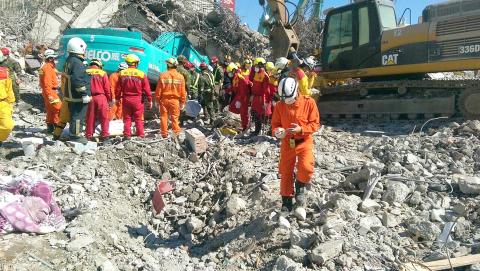Tainan Mayor William Lai (賴清德) at 4:20pm yesterday announced that the search-and-rescue operation at the Weiguan Jinlong complex in Tainan, which collapsed in an earthquake on Feb. 6, has come to an end, after the body of the last missing resident was found.
According to Central Emergency Operations Center statistics, the death toll from the magnitude 6.4 earthquake yesterday rose to a total of 116, of which 114 occurred at the Weiguan Jinlong complex, with one person who lived near the complex still missing.
The last body, which was recovered at 3:57pm yesterday, was the building’s management committee chairman, Hsieh Chen-Yu (謝鎮宇), who lived in building G, Lai said.

Photo: Hung Mei-hsiu, Taipei Times
Tainan Deputy Mayor Tseng Hsu-cheng (曾旭正) said the only person still missing after the earthquake is a woman surnamed Lin (林), who lived near the Weiguan Jinlong complex and had a habit of going out to exercise early every morning. Lin’s family has been unable to contact her since the earthquake.
The use of heavy equipment to break up and clear away rubble from the site was authorized in the hope of rescuing everyone as soon as possible, Lai said, adding that experience gained from the recovery work could be used as a reference by the National Fire Administration when considering rescue procedures in the future.
If rescue workers can use heavy equipment to retrieve bodies intact from the rubble, it means that such equipment could also be used to accelerate the search for survivors in sections that search-and-rescue personnel would not be able to reach by themselves, he said.
Even though heavy equipment was ready for use 36 hours after the earthquake, authorities were required to follow regulations and could only allow their use 62 hours after the event, which created a dilemma, Lai said.
The Construction and Planning Administration said it would expand a two-year-old-building examination project, increasing the number of buildings that are to receive subsidies of NT$8,000 for surveys and improvements this year from 500 to 2,000.
Priority is to be given to buildings in the six special municipalities and southern counties, with an emphasis to be placed on ensuring the structural safety of buildings, the administration said, adding that applications for the subsidy might begin as soon as next month.
The project, which is to examine the ability of private buildings to resist earthquakes and provide a subsidy for improvement measures, was planned in July last year, administration Director Hsu Wen-lung (許文龍) said, adding that because of the earthquake, the agency has decided to expand its scale to 2,000 buildings.
Preliminary evaluations are to include checking for cracks on buildings’ beams and pillars and peeling on exterior walls, Hsu said.
Due to southern residents’ concerns about the structural safety of buildings they live in after the earthquake, the administration is to subsidize buildings in southern Taiwan first, he added.

Tropical Storm Gaemi strengthened into a typhoon at 2pm yesterday, and could make landfall in Yilan County tomorrow, the Central Weather Administration (CWA) said yesterday. The agency was scheduled to issue a sea warning at 11:30pm yesterday, and could issue a land warning later today. Gaemi was moving north-northwest at 4kph, carrying maximum sustained winds near its center of up to 118.8kph and gusts of 154.8kph. The circumference is forecast to reach eastern Taiwan tomorrow morning, with the center making landfall in Yilan County later that night before departing from the north coast, CWA weather forecaster Kuan Shin-ping (官欣平) said yesterday. Uncertainty remains and

SEA WARNING LIKELY: The storm, named Gaemi, could become a moderate typhoon on Wednesday or Thursday, with the Taipei City Government preparing for flooding A tropical depression east of the Philippines developed into a tropical storm named Gaemi at 2pm yesterday, and was moving toward eastern Taiwan, the Central Weather Administration (CWA) said. Gaemi could begin to affect Taiwan proper on Tuesday, lasting until Friday, and could develop into a moderate typhoon on Wednesday or Thursday, it said. A sea warning for Gaemi could be issued as early as Tuesday morning, it added. Gaemi, the third tropical storm in the Pacific Ocean this typhoon season, is projected to begin moving northwest today, and be closest to Taiwan on Wednesday or Thursday, the agency said. Today, there would likely

DISRUPTIONS: The high-speed rail is to operate as normal, while several airlines either canceled flights or announced early departures or late arrivals Schools and offices in 15 cities and counties are to be closed today due to Typhoon Gaemi, local governments announced last night. The 15 are: Taipei, New Taipei City, Taoyuan, Tainan, Keelung, Hsinchu and Kaohsiung, as well as Yilan, Hualien, Hsinchu, Miaoli, Chiayi, Pingtung, Penghu and Lienchiang counties. People should brace for torrential rainfall brought by the storm, with its center forecast to make landfall on the east coast between tonight and tomorrow morning, the Central Weather Administration (CWA) said. The agency issued a sea warning for the typhoon at 11:30pm on Monday, followed by a land warning at 11:30am yesterday. As of

CASUALTY: A 70-year-old woman was killed by a falling tree in Kaohsiung as the premier warned all government agencies to remain on high alert for the next 24 hours Schools and offices nationwide are to be closed for a second day today as Typhoon Gaemi crosses over the nation, bringing torrential rain and whipping winds. Gaemi was forecast to make landfall late last night. From Tuesday night, its outer band brought substantial rainfall and strong winds to the nation. As of 6:15pm last night, the typhoon’s center was 20km southeast of Hualien County, Central Weather Administration (CWA) data showed. It was moving at 19kph and had a radius of 250km. As of 3pm yesterday, one woman had died, while 58 people were injured, the Central Emergency Operation Center said. The 70-year-old